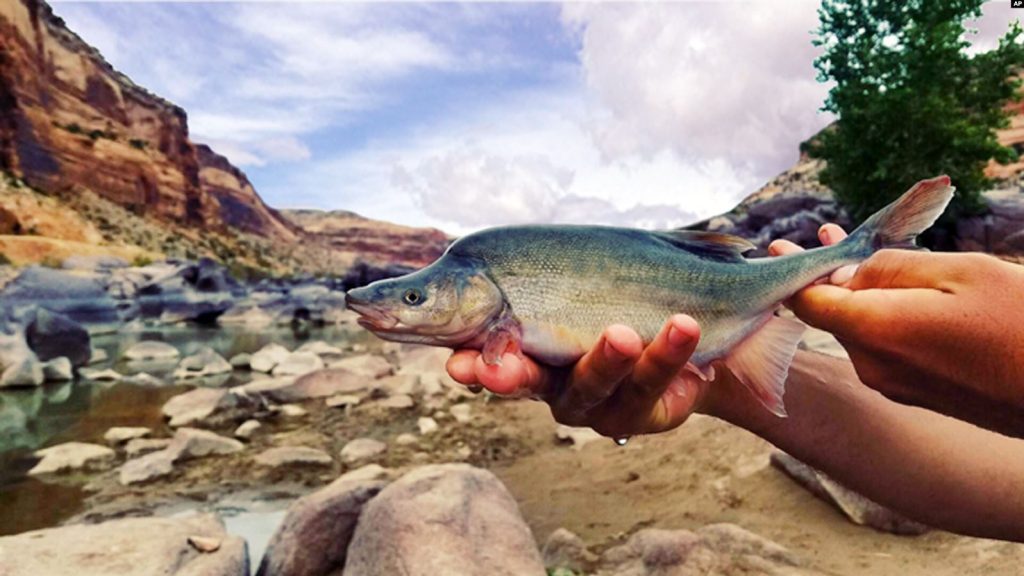پادکست VOA: اصطلاحات انگلیسی – اصطلاحات ماهیگیری
سلام با هشتاد وششمین قسمت از مجموعه “Words and Their Stories” (کلمات و داستان آن ها) از سری پادکستهای VOA در خدمت شما هستیم. این مجموعه پادکست به توضیح اصطلاحات رایج زبان انگلیسی، داستان ایجاد شدنشون و نحوه استفاده از آن ها در مکالمه می پردازه. در این قسمت از پادکست VOA: اصطلاحات انگلیسی – اصطلاحات ماهیگیری قراره با کاربرد و معنی چندتا اصطلاح جالب با کلمات مربوط به ماهیگیری مثل “hook, line and sinker” (قلاب ، طناب و وزنه) آشنا بشی. در کنارش چندین کلمه ی کاربردی دیگه هم یاد میگیری که لیست این کلمه ها به همراه معنی اون ها در پایان مطلب قرار گرفته.
وقتی کسی یه داستانی رو “”hook, line and sinker” (قلاب ، طناب و وزنه)” باور میکنه یعنی کاملا گولش رو می خوره. چیزی که “fishy” (ماهی ای!) باشه یعنی مشکوکه. “fish story” (داستان ماهی ای) داستانیه که اینقدر عجیبه که باورکردنش سخته. وقتی برای چیزی “fishing for ” (ماهیگیری کردن برای) می کنی یعنی سخت دنبالش هستی. “have bigger fish to fry” (ماهی بزرگتری برای سرخ کردن داشتن) یعنی الان وقت ندارن با این مشکل کوچیک سروکله بزنن.
VOA – Words and Their Stories – 86: Fishing for More Than Fish

متن انگلیسی پادکست VOA: اصطلاحات انگلیسی – اصطلاحات ماهیگیری :
Now, the VOA Learning English program Words and Their Stories.
On this program we talk about common expressions and phrases in American English.
Today, grab your poles and bait. We are going fishing!
Fishing is a popular outdoor activity you can do in lots of different places. You can go ice fishing, deep sea fishing, or fly fishing in a river, to name a few examples.
Whatever type of fishing you do, the equipment is similar. In addition to a fishing pole, you will need a fishing hook, a fishing line and sometimes, a sinker.
But in conversation, we don’t use the expression “hook, line and sinker” when we are talking about catching a fish. We use it to describe fooling someone who is easy to fool. In other words, they are gullible.
When people believe a story “hook, line and sinker,” they accept it completely – even though it is a big, fat lie. Note that the expression usually begins with the verbs “buy” or “fall.” For example, “he fell for my excuse hook, line and sinker,” or, “she bought my story hook, line and sinker.”
But what about people who are not so gullible? When something sounds even the slightest bit fishy, they do not believe it. The word “fishy” means “likely untrue.” In other words, something that sounds fishy sounds like a lie. For this one, we also say smells fishy – a phrase I think is even better.
Now, if you tell someone a fish story, you are telling them a story that is so strange or surprising that it seems very unlikely to be true. It is an exaggeration. We tell others fish stories when we want to brag or show off.
This expression comes from the fact that people who fish often say their catch is bigger than it really was.
But fish stories don’t have to be about fish. We can exaggerate about anything. Take my friend, for example. He loves to tell people about the time he was attacked by a swarm of bees. Each time he tells the story, the amount of bees and bee stings increase. At last count, it was a million bees and thousands of stings. It’s his very own fish story.
Now, back to real fishing for a minute.
Let’s say you are planning a long, complicated fishing tour. This is not just a one- or two-day trip. It is a fishing expedition.You are not sure what you will catch. But you are going to spend a lot of time and effort trying to catch something.
In conversation, a “fishing expedition” is very similar. A fishing expedition is a general search. It does not stick to a stated goal, but hopes to uncover useful evidence or information.
For example, if a police detective is on a fishing expedition, she may ask all the people who were near a crime in their neighborhood. She does not know if any of them are guilty or if they know anything. But she hopes one of them will give evidence about the crime.
Now, you can “fish” for many other things too.
A writer can fish around for a good story idea. She may ask many people lots of general questions about their lives before finding something interesting to write about.
And let’s say your co-worker asks you a lot of questions about your personal life. He does not have a clear reason why. He just seems to be fishing around for information. It makes you more than a little uncomfortable.
And it should! That’s the thing with this expression. When we go fishing for information or evidence or whatever, we do plan to use it. In fact, we can also fish for something to feel better about ourselves.
If I am fishing for compliments I want you to say something nice about me. So, for example, let’s say I give you one of my homemade chocolate chip cookies. As you take a bite, you make sounds that show you really like it. Then I ask, “So, how are my cookies?” I know they taste great. I’m just fishing for compliments.
Usually people who fish for compliments annoy others. But in this case, you probably will not feel annoyed. After all, you get to eat a delicious cookie!
Speaking of delicious food, fried fish can also be very tasty. The fish is dipped into a batter and then fried in oil. The bigger the fish, the better!
Funny enough, the expression to have bigger fish to fry has nothing to do with cooking fish. This expression compares an important problem to a minor one. People who have bigger fish to fry don’t have time to deal with a small fish … I mean, problem.
Now, let’s hear these expressions used in a conversation between two, um, co-workers, you could say.
Hey. Did you bring another flashlight? My batteries are low.
Of course. I always bring an extra one, just in case. But I also have extra batteries if you want those instead.
Just give me the flashlight.
Isn’t it helpful that I’m so prepared?
Yes, it is. Now stop fishing for compliments and hand me the screwdriver. We have don’t have much time to open this lock!
Hey, can I ask you something? Yesterday, Joe from the cafe asked me a lot of questions. I got the feeling he was fishing for information about our … you know, job. Do you think he knows something?
Joe? He doesn’t know a thing. What did he ask you?
He wanted to know what I did during the day and how I spend my nights. And then he asked me what I was doing tonight. It was weird.
Sounds like he was just on a fishing expedition. But you know, he also asked me about my plans tonight.
What did you tell him?
I told him I was going to a book club.
A book club? Really? And he fell for that?!
Yeah, he fell for it hook, line and sinker. Didn’t doubt it for a minute.
You don’t think that excuse sounds kind of fishy? I think it sounds very fishy.
What’s so fishy about my going to a book club? Is it SO hard to believe I would belong to a book club?
No! It’s just that …
I do read, you know!!
You’re right. You’re right. I am sorry.
Thank you.
I didn’t mean to judge you.
Look, just forget about it. Right now, we have bigger fish to fry.
What do you mean?
“This is the police! We have you surrounded! Come out with your hands up!”
Oh no! The police!
And that brings us to the end of Words and Their Stories.
If you liked this week’s story about fish expressions and our conversation between two bank robbers, let us know in the Comments Section.
Don’t worry. We’re not fishing for compliments. We just want to know what type of stories you like!
I’m Bryan Lynn …
… and I’m Anna Matteo.
You and me goin’ fishing in the dark
Lying on our backs and countin’ the stars
Where the cool grass grows.
Down by the river in the full moonlight,
We’ll be fallin’ in love in the middle of the night …
Anna Matteo wrote this story for VOA Learning English. Kelly Jean Kelly was the editor. The song at the end is The Nitty Gritty Dirt Band singing “Fishing in the Dark.”
لیست واژگان این پادکست
bait (طعمه)– n. something (such as a piece of food) that is used to attract fish or animals so they can be caught
hook (قلاب)– n. a curved or bent tool for catching, holding, or pulling something
sinker (وزنه ماهیگیری)– n. a weight used for holding a fishing line or net underwater
gullible (زودباور)– adj. easily fooled or cheated
exaggeration (مبالغه)– n. to think of or describe something as larger or greater than it really is
brag (لاف زدن)– v. to talk about yourself, your achievements, your family, etc., in a way that shows too much pride
show off (خودنمایی کردن)– v. a person who tries to impress other people with his or her abilities or possessions
swarm (کپه ای از حشرات)– n. a very large number of insects moving together
expedition (هیئت اعزامی به سفر)– n. a group of people who travel together to a distant place
delicious (خوشمزه)– adj. very pleasant to taste
batter (خمیر)– n. a mixture of flour and a liquid (such as egg, oil, or water) that is used to cover food before it is fried
weird (عجیب و غریب)– adj. unusual or strange
امیدوارم از پادکست VOA: اصطلاحات انگلیسی – اصطلاحات ماهیگیری لذت برده باشید. برای دسترسی به قسمت های دیگر این پادکست می توانید از صفحه ی پادکست VOA – اصطلاحات انگلیسی آکادمی مجازی آموزش زبان ۲۴talk دیدن کنید.
همچنین برای گوش دادن به پادکست های سطح بندی شده British Council می توانید به صفحه ی پادکست British Council آکادمی مجازی آموزش زبان ۲۴talk یا برای گوش دادن به پادکست های BBC به صفحه ی پادکست ۶ دقیقه انگلیسی (BBC) آکادمی مجازی آموزش زبان ۲۴talk مراجعه کنید.
گوش دادن به پادکست روش خوبی برای تقویت مهارت شنیداری و هم چنین یادگرفتن کلمات در بستر یک موضوع خاصه که این به تقویت مهارت مکالمه انگلیسی نیز کمک زیادی می کنه.
اگه دنبال این هستی که مهارت های مکالمه زبان انگلیسیت رو بیشتر از این تقویت کنی بهت پیشنهاد میکنم در دورهی مکالمه زبان انگلیسی آکادمی مجازی آموزش زبان انگلیسی ۲۴talk شرکت کنی که با یه برنامه منسجم و خلاقانه کمک میکنه در زمان کوتاه بتونی به راحتی و روانی انگلیسی صحبت کنی.







